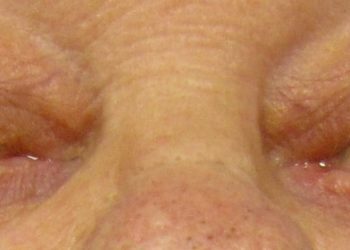Thymectomy effective in patients with non-thymomatous myasthenia gravis: The MGTX trial
1. Thymectomy with prednisone was significantly more effective than prednisone alone in reducing disease severity and prednisone requirements in non-thymomatous myasthenia gravis (MG).
2. While treatment-associated complications between thymectomy with prednisone and prednisone alone were similar, thymectomy also improved other clinical outcomes regarding safety and quality of life.
Evidence Rating Level: 1 (Excellent)
Study Rundown: Thymic abnormalities – hyperplasia or thymomas – are found in the majority of patients with MG. Given the clear association, thymectomy has been used to treat patients regardless of the type of pathologic change. Yet, no randomized trials have examined the benefit in MG patients without a thymoma. This study assessed the safety and efficacy of thymectomy versus prednisone alone in this cohort. Primary outcomes of interest measured efficacy based on the Quantitative Myasthenia Gravis score (QMGS) and prednisone requirements over a 3-year period and demonstrated significant benefit in the thymectomy group. Secondary outcomes included various measures of safety and quality of life and further supported the beneficial role of thymectomy in non-thymomatous patients with MG.
At the 3-year end point, the time-weighted QMGS and the time-weighted estimated prednisone dose was significantly lower in the thymectomy group compared to prednisone only group. Furthermore, there were significantly fewer treatment associated symptoms, hospitalizations, azathioprine use, and lower number of patients reaching minimal manifestation status in the thymectomy group compared to the prednisone group. Weaknesses include the lack of scientific rigor in the pill count method used to measure prednisone requirements and the risk of experimenter bias due to only single-blinding.
Click to read the study, published today in NEJM
Relevant Reading: Is thymectomy in non-thymomatous myasthenia gravis of any benefit?
In-Depth [randomized controlled trial]: The MGTX trial was a multicenter, randomized, controlled trial that included a total of 7513 participants. All patients were administered prednisone if not already receiving it at baseline. Half were randomized to the thymectomy group while the other half only received prednisone. The primary outcomes were the time-weighted QMGS and time-weighted prednisone requirements at 3 years. Secondary outcomes included adverse events (hospitalization days over the 3-year period), clinically validated QOL surveys and a quantitative daily living score, patients who achieved minimal-manifestation status, and the use of other nonglucocorticoid treatments.
Through the first 3 years of the trial, the time-weighted QMGS was an estimated 2.85 points lower (99.5%CI 0.47 to 5.22; p < 0.001) and the time-weighted average prednisone dose was an estimated 16 mg lower (95%CI 7 to 25; p < 0.001) in the thymectomy versus prednisone-alone group. No significant difference was found between treatment associated complications based on patient surveys (p = 0.73), though surveys indicated fewer treatment associated symptoms in the thymectomy group (p < 0.001). Significantly fewer patients were hospitalized in the thymectomy group (9% vs. 37%, p < 0.001). The thymectomy group demonstrated a significantly lower level of azathioprine use (17% vs. 48%, p < 0.001), lower percentage of patients reaching minimal-manifestation status at the 3-year period (67% vs 47%, p = 0.03), and scores on the MG Activities of Daily Living scale (2.24 vs. 3.41, p = 0.008).
Image: CC/Wiki
©2016 2 Minute Medicine, Inc. All rights reserved. No works may be reproduced without expressed written consent from 2 Minute Medicine, Inc. Inquire about licensing here. No article should be construed as medical advice and is not intended as such by the authors or by 2 Minute Medicine, Inc.





